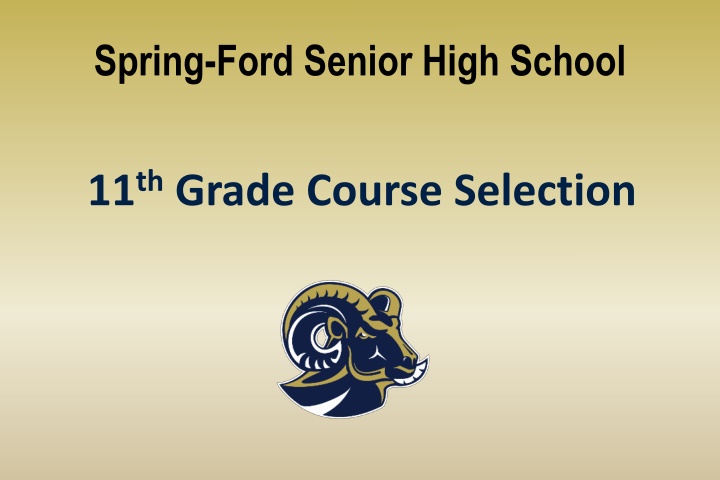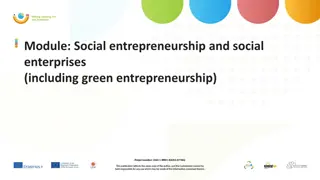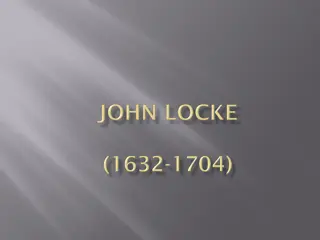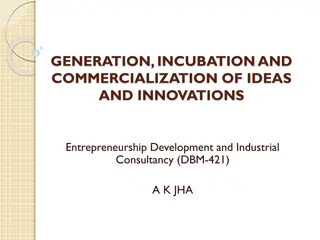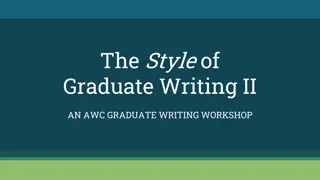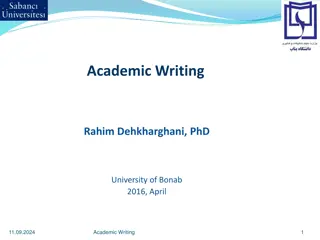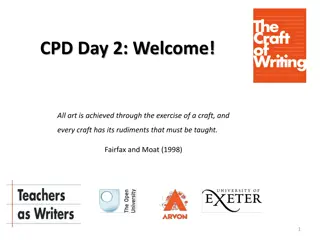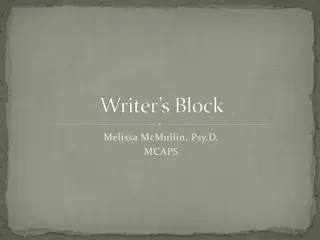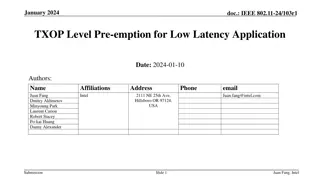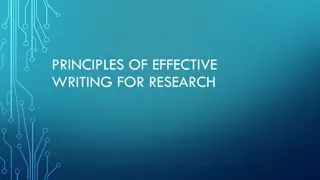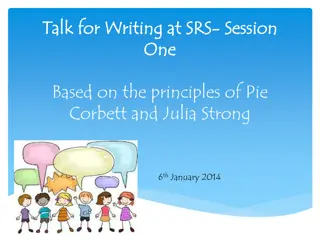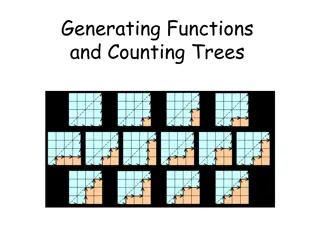Effective Pre-Writing Strategies for Generating Ideas
Explore pre-writing strategies such as freewriting, brainstorming, questioning, and clustering to spark creativity, organize thoughts, and develop engaging content. Discover how and when to use these techniques effectively during the writing process.
Download Presentation

Please find below an Image/Link to download the presentation.
The content on the website is provided AS IS for your information and personal use only. It may not be sold, licensed, or shared on other websites without obtaining consent from the author.If you encounter any issues during the download, it is possible that the publisher has removed the file from their server.
You are allowed to download the files provided on this website for personal or commercial use, subject to the condition that they are used lawfully. All files are the property of their respective owners.
The content on the website is provided AS IS for your information and personal use only. It may not be sold, licensed, or shared on other websites without obtaining consent from the author.
E N D
Presentation Transcript
Spring-Ford Senior High School 11thGrade Course Selection
Graduation Requirements Students must earn at least 22 credits to graduate including the following: 4 credits English 3 credits Social Studies 3 credits Mathematics 3 credits Science .4 credit Health 1.6 credits PE 7 credits Elective
Spring-Ford Area High School Program of Studies Course Book www.spring-ford.net and choose Senior High School Look for the Course Selection Tab on the left side There, you will locate the Spring-Ford Area High School Course Book and resources
As Juniors you must take: English Math Science Social Studies Physical Education Health Electives For an average of 6.4 credits
Keep In Mind.Prerequisites Example: Chemistry Honors (11thgrade) Math Concurrent: Algebra II Honors or Pre-Calc Prerequisite: Recommendation of biology teacher
Electives: Major and/or Minor Art & Music Broadcasting Business Technology Computer Education English minors Family & Consumer Science Project Lead The Way (PLTW) Technology Education World Language Global Studies Program
Weighted Classes? What Are They? Honors, Dual Enrollment (DE) & Advanced Placement (AP) courses receive additional weight calculated into weighted Grade Point Average (GPA). In order to receive the weight students must achieve a 70% or above in the course.
A few words about HONORS & AP courses: Superior ability History of advanced achievement in subject area Self-motivation, commitment and strong work ethic Ability to meet rigorous course expectations Teacher recommendation and prerequisites
Advanced Placement (AP) College level coursework in a high school setting AP exams are offered each May for students enrolled in AP courses Scores of 3 or higher (out of 5) may provide savings in tuition for certain college courses Scores of 3 or higher may qualify you to take higher level college courses
Cooperative Education (Co-op) Allows students to get real-world career experiences while still in high school. This gives students the opportunity to: Explore potential careers by working hands-on in area of interest Learn valuable workplace skills and network with professionals that may lead to future employment Gain a competitive edge on college admission to programs that require demonstrated knowledge of field such as nursing, OT, PT, pre-med, etc.
Cooperative Education (Co-op) A few important things to note about co-op: Students can do a co-op in almost any career field- ex: education (teaching), engineering, medical, secretarial, food service, political, retail, etc. Not all co-ops pay, but some do! Students can do a 1, 2, or 3 credit option (see course book for details) Students can find their own placement or work with Mr. Scheck to find a co-op placement. Students must work with both their school counselor and Mr. Scheck to apply to the co-op program, choose the appropriate co-op credit option, and secure their co-op placement before next fall.
Dual Enrollment (Full or Part Time) Available to all students Excellent opportunity to experience college level coursework while still in the high school environment Dual Enrollment courses are listed in the course selection book Students must pay tuition (including text books) to the college or university in order to take these courses If you are planning to take two or more Dual Enrollment courses, please see your counselor
Dual Enrollment Things to remember Only seniors who take dual enrollment classes are eligible for open campus. Juniors will be assigned study halls. Any dual enrollment student carrying over 7.0 credits will not have their second semester dual enrollment course calculated in class rank or GPA Students will not be permitted to drop a spring semester dual enrollment class Senior Final Exam Exemption does not apply for these college classes Dual Enrollment classes will count toward elective graduation requirements.
Dual Enrollment Things to remember All students must apply to the dual enrollment program before leaving for summer break. Contact Mrs. in the SussmanFPC for application instructions (msuss@spring- ford.net). In addition to registering through Spring-Ford, all students must register for dual enrollment classes (MCCC or Arcadia) in the fall. Payment must be made to the college the semester the course is being taken.
Global Studies Program Honors level program with an emphasis on history, government, and world language. Partnership with Arcadia University. 80% GPA or higher is required. Unique learning experiences via distance learning and dual enrollment with Arcadia University. Please see your counselor for more information. Additional information in Course Book
Project Lead The Way (PLTW) PLTW is a nationally recognized pre-engineering curriculum focusing on the application of math and science skills for students interested in further engineering studies. Rigorous weighted honors level studies in preparation for STEM (Science, Technology, Engineering and Math) related career fields. Course titles: Introduction to Engineering Design, Principles of Engineering, Digital Electronics, Civil Engineering and Architecture. PLTW Biomedical Science courses are also offered at the WMCTC. All are honors level courses. Please see your counselor for more information. Additional information in Course Book.
A Few Words About World Languages Due to the cumulative nature of language learning, students should earn a passing grade on both the mid-term and the final exams, as well as an overall yearly average of 75% or better in order to move on to the following level. Furthermore, while we recommend that college-bound students study at least two years of a world language, those students planning to seek admission to more selective colleges should definitely consider studying a language for three or more consecutive years.
Western Montgomery Career & Technology Center Day Afternoon Program at WMCTC, level 2 3 major classes in 10-12 Building: English, Science or Social Studies, and Math Please see your counselor if you are interested in beginning next year. Apply online
Course Selection Process View teacher recommendations pre-entered into Skyward Enter your elective requests in Skyward Course Verification Sheets will be provided in the spring for review and parent acknowledgment Schedules will be posted in Skyward in August
Requesting and Verifying Courses in Skyward Link to information on Requesting Courses in Skyward Link to information on Verifying Courses in Skyward
Future Planning Center College and Career Resource Center for students and parents. The FPC assists students/parents with the following: Exploring student strengths and career interests Identifying post-secondary education/training/military options that align with career goals Preparing for standardized testing (ACT/SAT/PSAT/AP/ASVAB) Completing college, financial aid, and scholarship applications
College Athlete??? NCAA Eligibility Requirements Are Specific, including 16 Core Courses! You must complete NCAA Student Athlete Identification Form located on the Future Planning Center page under the College Athletics tab. DI and DII Athletes must register with the NCAA Eligibility Center at eligibilitycenter.org Submit the Self-Identification Form to the FPC
NO CHANGES NO COURSE CHANGES WILL BE HONORED AFTER June 23, 2022!
Need Help? Contact your counselor with questions. Students A-L Mr. Murlless bmurl@spring-ford.net Students M-Z Mrs. Beideman kbeid@spring-ford.net Western Center Ms. Landis clandis@westerncenter.org Western Center Ms. Powers jpowers@westerncenter.org
